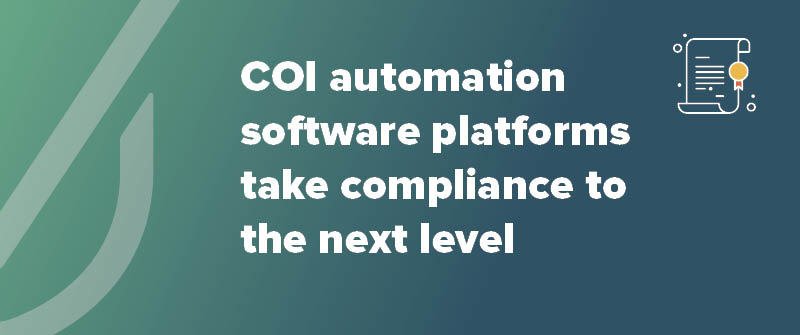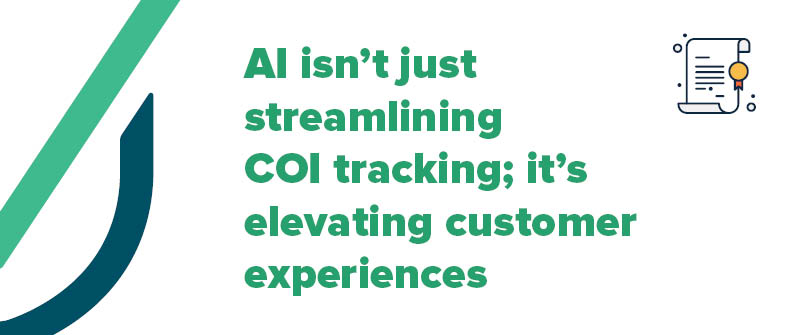
Tracking insurance certificates can be a major headache for businesses tasked with keeping up with their partners’ compliance status. Between chasing down vendors, double-checking coverage details, and manually updating spreadsheets, the process is becoming tiresome, redundant, and quite frankly, outdated.
That’s all changing with AI-powered certificate of insurance (COI) tracking software. Goodbye, endless paperwork and makeshift workarounds; hello, efficiency!
COI tracking that depends on manual processes is prone to errors, and even small mistakes, like missing a crucial coverage detail or failing to update an expired certificate, can lead to compliance violations, legal issues, or costly financial risks. AI-driven COI management removes much of this risk by automating verification processes, detecting discrepancies in real time, and transforming compliance management, ensuring greater accuracy and reliability.
How exactly does AI stack up against the old-school approach? In this blog, we’ll break it all down.
What Is the Difference Between Artificial Intelligence and Traditional Methods?
Unlike existing systems that treat compliance as a box to check, AI-driven platforms like myCOI are revolutionizing COI tracking. Conventional COI tracking relies heavily on human effort and lots of it. Employees must manually collect, review, and file COIs, often cross-referencing spreadsheets or outdated software.
Conventional COI tracking relies heavily on human effort. Employees must manually collect, review, and file COIs, often cross-referencing spreadsheets or outdated software.
The manual approach, while tried and true, is not only slow and prone to errors, but it’s also hard to scale. And with something that requires so much attention to detail, gained speed usually isn’t worth the potential drop in accuracy.
Basic automated systems improve efficiency by digitizing COI collection and tracking expiration dates. However, they typically operate on rigid rule sets, still requiring human oversight to interpret policy details, spot inconsistencies, and ensure compliance. These systems help speed up the process but can leave gaps in risk detection.
AI, on the other hand, learns, adapts, and improves over time. Instead of simply following pre-set rules, AI-powered COI tracking systems analyze vast amounts of data to detect patterns, flag risks, and provide actionable insights for teams. Working with AI can result in:
- Higher accuracy. AI reduces human error by intelligently validating COIs against policy requirements.
- Greater efficiency. Real-time tracking and automated alerts provide time savings and prevent compliance lapses before they become an issue.
- Cost savings. With AI doing lots of the heavy lifting here, businesses can allocate their resources more strategically.
There’s one more significant advantage we haven’t mentioned yet. AI-powered systems don’t just process data; they interpret it. myCOI’s advanced AI capabilities like intelligent recommendations and insights empower companies to anticipate risks rather than react to them, allowing for a more proactive approach to risk management.
How Do Artificial Intelligence AI Programs Differ from Non-Automated Programs?
Conventional software is great for many reasons. Like AI, these digital systems help streamline processes by learning and following programming rules. Unlike AI, they are bound by their strict rules, which creates structure but can limit adaptability and certainly lack the learning capability that machine learning systems offer.

On the other hand, COI automation software platforms take compliance to the next level with things like:
- Context-aware decision-making. AI can learn to understand context and nuance, such as peculiar terms in insurance compliance language, taking potential gap identification beyond basic checklists.
- Automation with intelligence. Instead of just sorting COIs, AI-powered platforms make informed recommendations based on historical data and industry trends.
- Scalability. AI can process large datasets, even handling thousands of COIs simultaneously and adapting to changing compliance needs, without increasing administrative burden.
- Integration capability. Whether syncing with ERPs, CRMs, or insurance databases, AI-powered COI tracking software ensures compliance is not an isolated function but a fully embedded part of operations.
- Tailored oversight. AI ensures every COI meets your organization’s unique risk requirements, saving your team from sifting through policy fine print. Every flagged discrepancy means valuable insights, as opposed to hours of manual checks.
- Effortless communication. Forget endless back-and-forths. AI-powered dashboards give vendors and compliance teams shared, real-time updates. Proactive updates eliminate confusion before questions arise.
- Proactive risk management. AI doesn’t wait for a problem to surface; it identifies compliance risks and emerging patterns before they become liabilities, allowing you to focus on proactive problem-solving.
- Third-party collaborations. AI streamlines interactions between businesses, vendors, and insurers by automating document requests, verification, and follow-ups, ensuring compliance without delays or unnecessary friction.
- Communication at scale. AI-powered workflows enable automated reminders, status updates, and alerts across multiple stakeholders to keep everyone on the same page without overwhelming manual effort.
How AI and Machine Learning Are Used to Transform the Insurance Industry?
AI is reshaping the insurance industry in numerous ways, increasing efficiency across sectors and ultimately shifting strategies from reactive compliance to proactive risk mitigation. In COI tracking, here are some of the transformations we’re starting to see:
- Risk assessment and compliance automation. AI evaluates COIs in real time and against up-to-date sources to ensure that certificates meet both industry standards and contractual agreements.
- Predictive analytics. Machine learning is identifying patterns in insurance verification, helping businesses anticipate and address compliance risks before they cause issues.
- Customer experience improvements. By streamlining COI requests and approvals with the enhanced efficiency of AI, communication between businesses, insurers, and vendors is improved, and everyone is kept in the loop.
- Context-aware decision-making. AI can interpret complex insurance language, detecting nuanced risks that might be missed in traditional compliance checks to ensure that compliance isn’t just about meeting baseline requirements but mitigating real financial and legal exposure.
- Seamless third-party collaboration. Sophisticated AI-powered tracking systems integrate well with ERPs, CRMs, insurance tracking software, and more, allowing insurers, vendors, and businesses to operate and communicate in sync.
- Proactive risk management. By analyzing historical data, AI predicts and helps businesses mitigate risks before they escalate, ensuring ongoing compliance.
Picture a construction firm that manages thousands of vendor COIs. Traditionally, an administrator would manually verify each document, leaving lots of room for error, especially in busier seasons. With an AI-powered platform, COIs are scanned, validated, and flagged for inconsistencies instantly – freeing up time and ensuring compliance is never left to chance.
How Does Artificial Intelligence AI Affect Customer Behavior and Tracking?
AI isn’t just transforming how businesses manage COIs. It’s also affecting how vendors and third-party partners interact with compliance processes. These tools are helping change people’s perspectives of compliance from a bureaucratic burden to a simple process backed by transparency and trust.

By analyzing large amounts of data, AI-powered systems can provide more granular insights into customer behavior, allowing companies to anticipate needs, personalize services, and truly enhance user experiences. In COI tracking, this means companies can identify trends in compliance gaps, vendor reliability, and industry risks, leading to more informed decision-making. So, instead of treating compliance as a one-size-fits-all process, AI helps companies tailor recommendations based on historical data and changing regulations.
These tools are also improving customer engagement with things like automated reminders and interactive dashboards. These tools reduce frustration for both businesses and vendors and improve communication for all parties.
AI isn’t just streamlining COI tracking; it’s elevating customer experiences, which translates to a positive impact on customer satisfaction and your overall business.
Strengthen Your COI Tracking with AI
If you’re ready to move beyond outdated tracking methods and take a proactive approach to COI compliance, let’s talk. Give us a call today to see how AI can revolutionize your risk management strategy.